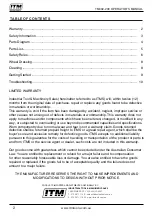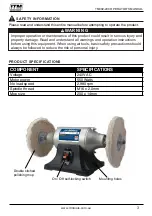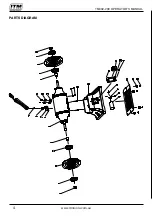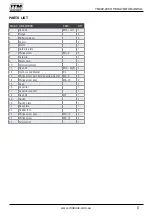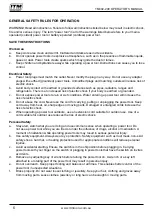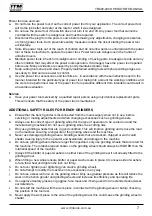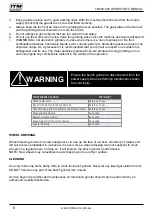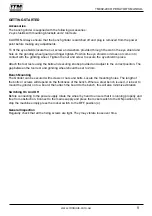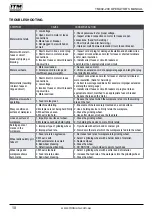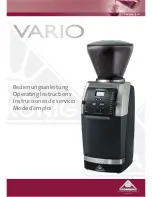
TM402-200 OPERATOR’S MANUAL
Power tool use and care
a. Do not force the power tool. Use the correct power tool for your application. The correct power tool
will do the job better and safer at the rate for which it was designed.
b. Do not use the power tool if the switch does not turn it on and off. Any power tool that cannot be
controlled with the switch is dangerous and must be repaired.
c.
Disconnect the plug from the power source before making any adjustments, changing accessories,
or storing power tools. Such preventive safety measures reduce the risk of starting the power tool
accidentally.
d. Store idle power tools out of the reach of children and do not allow persons unfamiliar with the power
tool or these instructions to operate the power tool. Power tools are dangerous in the hands of
untrained users.
e. Maintain power tools. Check for misalignment or binding of moving parts, breakage of parts and any
other condition that may affect the power tools operation. If damaged, have the power tool repaired
before use. Many accidents are caused by poorly maintained power tools.
f.
Keep cutting tools sharp and clean. Properly maintained cutting tools with sharp cutting edges are
less likely to bind and are easier to control.
g. Use the power tool, accessories and tool bits etc., in accordance with these instructions and in the
manner intended for the particular type of power tool, taking into account the working conditions and
the work to be performed. Use of the power tool for operations different from intended could result in
a hazardous situation.
Service
a. Have your power tool serviced by a qualified repair person using only identical replacement parts.
This will ensure that the safety of the power tool is maintained.
ADDITIONAL SAFETY RULES FOR BENCH GRINDERS
a. Ensure that the bench grinder is disconnected from the mains supply when not in use, before
servicing or making adjustments and when changing accessories such as grinding wheels.
b. Always use the correct type of grinding wheel for the type of operation to be carried out and the
material being machined. Do not use a grinding wheel as a cutting disc.
c.
Only use grinding wheels that are in good condition. This will improve grinding and reduce the load
on the machine ensuring a longer life of the grinding wheel and the machine.
d. Never use damaged grinding wheels. Grinding wheels that are cracked, chipped or worn could
shatter causing injury to the operator and bystanders and damage to the machine.
e. Do not use grinding wheels that are larger than specified, only use grinding wheels that are rated for
the machine. The rotational speed shown on the grinding wheel should always be HIGHER than the
rotational speed of the machine.
f.
Always fit the blotter or paper washers on either side of the grinding wheel if not already fitted to the
grinding wheel.
g. When fitting a new wheel ensure blotter or paper washers are in place, fit concave side of washers
to face the wheel and tighten the lock nut firmly.
h. Do not over tighten (over tightening can crack a grinding wheel).
i.
Do not attempt to modify the machine or its accessories in any way.
j.
Do not use excessive force on the grinding wheel. Only use gradual pressure as this will reduce the
wear on the bench grinder and grinding wheels and increase its efficiency and operating life.
k.
Use approved safety glasses or goggles, face mask and if being used for an extended period wear
ear defenders.
l.
Do not start the machine with the work piece in contact with the grinding wheel or before checking
the position of the tool rest.
m. Never apply the work piece to the side of the grinding wheel, this could cause the grinding wheel to
shatter.
7
www.itmtools.com.au


